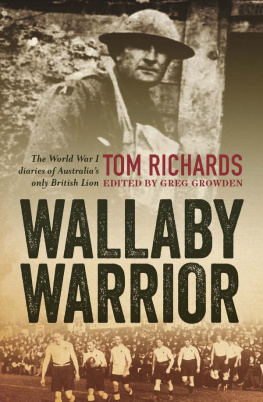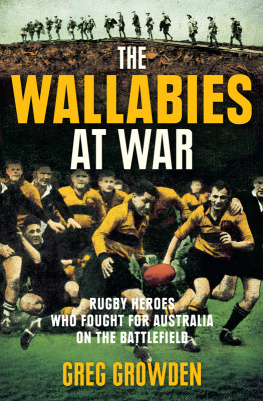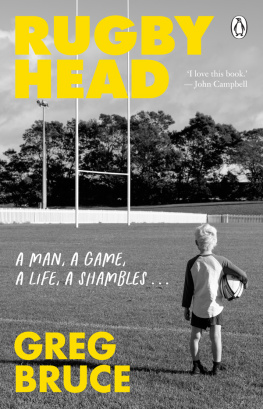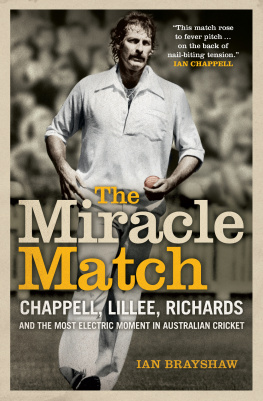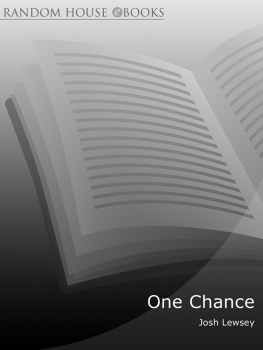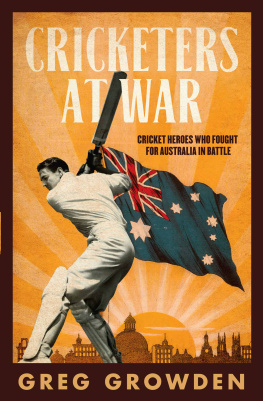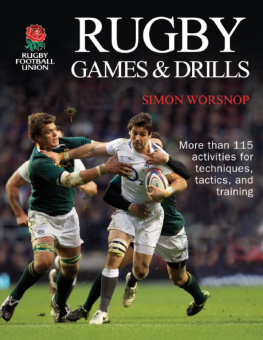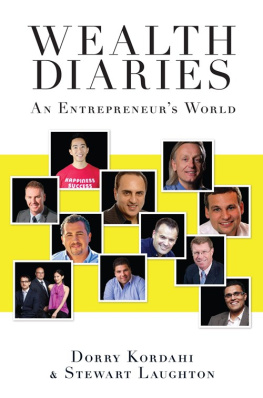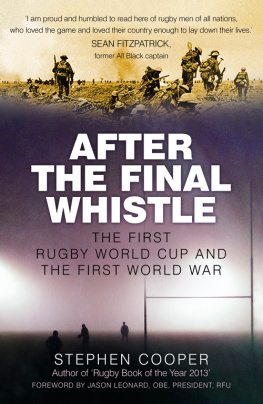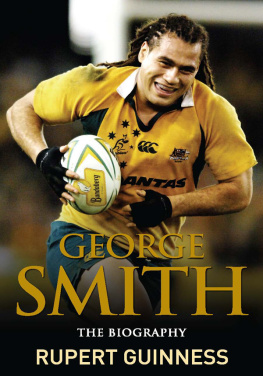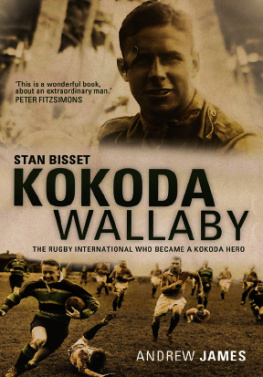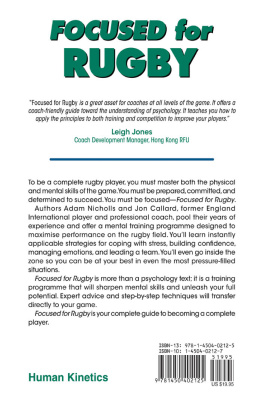
WALLABY
WARRIOR
The World War I diaries of Australia's
only British Lion
TOM RICHARDS
EDITED BY GREG GROWDEN

First published in Australia in 2013
Copyright Greg Growden 2013
All rights reserved. No part of this book may be reproduced or transmitted in any form or by any means, electronic or mechanical, including photocopying, recording or by any information storage and retrieval system, without prior permission in writing from the publisher. The Australian Copyright Act 1968 (the Act) allows a maximum of one chapter or 10 per cent of this book, whichever is the greater, to be photocopied by any educational institution for its educational purposes provided that the educational institution (or body that administers it) has given a remuneration notice to Copyright Agency Limited (CAL) under the Act.
Allen & Unwin
83 Alexander Street
Crows Nest NSW 2065
Australia
Phone: (61 2) 8425 0100
Email: info@allenandunwin.com
Web: www.allenandunwin.com
Cataloguing-in-Publication details are available from the National Library of Australia
www.trove.nla.gov.au
ISBN 978 1 74331 661 0
eISBN 978 1 74343 378 2
Typeset in 11/15pt Minion by Midland Typesetters, Australia
CONTENTS


While researching Gold, Mud n Guts: The incredible Tom Richards, footballer,war hero, Olympian, I discovered that Tom Richardss war diaries were held at the Australian War Memorial in Canberra. After countless SydneyCanberra trips, I was saved from going completely bonkers when the Richards family provided me with a copy of Toms diaries so that I could complete the manuscript. I am forever indebted to Richardss niece, Hazel Young, and his daughter, Joan Menck, for giving me permission to use them then and now.
Joan Menck is an inspiration, and I am delighted she has been so enthusiastic in ensuring her fathers war diaries were made available to a wider audience. I dedicate this book to her.
Editing the diaries was a difficult task as Richards was such an enthusiastic and relentless writer, often penning more than 1000 words each day during four years of war. As well as his thoroughness in describing everything that was going on around him, he also delved heavily into his feelings and inadequacies. To make the war diaries manageable I focused on the most important events and experiences and the most crucial descriptions. This also meant not sanitising the text, so I have retained Richardss original descriptions such as niggers and coons. While racist and derogatory, this is how the Australian soldier spoke during the First World War.

If ever the Earth had to select a Rugby Football team to play against Mars, Tom Richards would be the first player chosen, The Times of London gushed. The Yorkshire Post said that in matches Richards stood out like Saul among the prophets, and Londons Evening News described him as the best forward in the world. Whats more, he was also certainly (now girls!) the handsomest man in the team. Newspaper scribes seemed to compete over who could make Richards most resemble an athletic god, which was understandable following his pivotal role in Australian Rugby Unions first serious venture the tour of the United Kingdom in 190809, which lasted for seven and a half months. Richards was the standout player of that tour: an imaginative, fearless, clever forward. He convinced the northern hemisphere snobs that the colonials actually were the best at something. So accomplished were Richards and his fellow troubadours, who included pastoralists, train drivers, plumbers, bank clerks, gentlemen of leisure, surgeons, university layabouts and butchers, that following the tour they were chased by those with money to burn who were masterminding the establishment of the Northern Union professional code in Sydney. Almost immediately after arriving home, the core members of that first Wallabies team signed up for the big bucks on offer to play for the Rugby League rebels.
Richards, however, had better things to do. For him, expanding ones horizons was far more important than money; he wanted to broaden his mind, not his pockets. Coming from mining stock, he was self-conscious about his perceived lack of education and decided the best way to be with the world was to embrace the world. He wanted to discover the riches and mysteries of faraway continents. He endlessly pondered how civilisation operated. There were so many questions to be answered. He later explained: I aimed at travelling to distant lands, using Rugby as my passport and my ability as an introduction. He was a born wanderer, an international tourist at a time when travelling anywhere, even within Australia, was a challenge, often near impossible. Heading overseas was beyond the comprehension of virtually all.
Richardss constant drive to improve himself and his inability to keep still were instrumental in his winning an Olympic gold medal and becoming the only Australian-born Rugby Test player to represent the British and Irish Lions. He introduced surfing to France and then coached the French Rugby team for a Test match. Then, with a swag over his shoulder, he discovered the delights of Biarritz, Spain, the Riviera, northern Italy and Switzerland before meandering extensively through South Africa.
For such an active, inquiring man, serving as a soldier in wartime might be thought to have been the ultimate adventure. But Richards found that the long periods of inactivity and uncertainty, the endless waiting for instructions and action, and the bungling of his superiors frustrated his sense of organisation and leadership. When he became a leader, he showed courage, determination and doggedness that galvanised those around him. He won and held enemy positions, leading to his being awarded the Military Cross. Luckily for us, during his years at war he turned to his diary to record these achievements and frustrations.

John Richards, Toms father, was born and raised in Cornwall but at the age of 21 was off to Australia as soon as he heard about all the people making their fortune on the countrys goldfields. He tried Ballarat and Bendigo before convincing himself it was more lucrative to be at a tin settlement called Vegetable Creek, near Tenterfield in northern New South Wales. There, on April 29, 1882, Tom, nicknamed Rusty, was born.
When Tom was only one year old his nomadic father headed to the far reaches of Queensland after hearing of the latest strike in Charters Towers. Despite the never-ending boasts that their life was about to change for the best, it remained difficult. The Richardses never became rich. The big gold discovery did not come their way, and there was no alternative but for Tom from his teenage years to follow his father and three brothers into the mines. It was dreadful, soul-destroying, back-breaking work. Richards wrote: I worked in places with sweat clogging in my boots and oozing through the lace holes, amidst sickening fumes of exploded gelignite and floating screens of dust. I have often wondered how a human frame could stand such abuse, bullocking and heaving, sweating and swearing.
Next page
